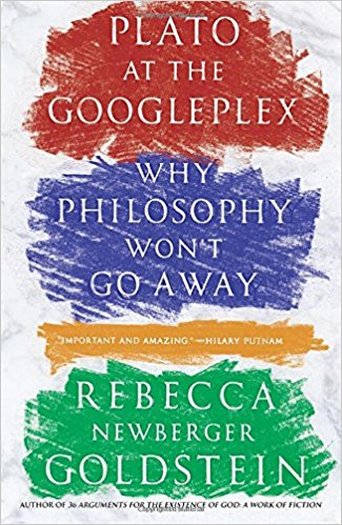
It is no surprise that someone who has spent a good part of his adult life studying and teaching philosophy wholeheartedly endorses this book about Plato. But even those who struggled through a standard course in philosophy should admit there is something compelling about projecting Plato into the 21st century as an author on a book tour, and relating his encounters with an audience of the technical elite at Google’s headquarters, as a panelist at a public discussion in New York City, responding to reader questions about their lives, loves and careers with an advice columnist, and being interviewed on cable news by a somewhat hostile host. Through this creative vehicle, Professor Goldstein highlights the relevance of Plato’s dialogues for us today and makes a compelling case for their stature as timeless classics.
For the most part, the expository sections of the book are also refreshingly clear and serve to underscore the book’s major assertions about Plato. I would summarize and prioritize these assertions as follows: (1) Plato’s dialogues describe the life and teaching of Socrates rather than present a system or theory we might be tempted to call Plato’s philosophy; (2) through his dialogues, we can see that Plato believed the perspective of all of us as individuals was inherently flawed and distorted. The only path to reduce the distortion and approach truth more closely was through dialogue with other individuals and the rigorous use of reason to adjudicate the inevitable differences. Plato’s dialogues thus take the form of discussions among several people. (3) Plato believed that everything in existence reflected an underlying rational structure, even though we as humans might be unable to fully comprehend that rational structure; (4) Plato believed that the pursuit of knowledge about the structure of everything was the path to truth, beauty and goodness, that humans had a natural affinity to pursue knowledge, and that the best kind of life was one which indulged this individual and collective pursuit.
Professor Goldstein has given us a true gem. There is a clear roadmap to how and where specific ancient dialogues relate to the issues whose relevance explodes from the pages of her book. In the process, Goldberg takes pains to point out that the parts of philosophy that have proven resistant to the scientific method form the foundation of our ability to claim any progress at all in the scientific arena. Hopefully, the book is making its way into the classroom as an entertaining and edifying complement to the works of the famous old dead dude himself.
For the most part, the expository sections of the book are also refreshingly clear and serve to underscore the book’s major assertions about Plato. I would summarize and prioritize these assertions as follows: (1) Plato’s dialogues describe the life and teaching of Socrates rather than present a system or theory we might be tempted to call Plato’s philosophy; (2) through his dialogues, we can see that Plato believed the perspective of all of us as individuals was inherently flawed and distorted. The only path to reduce the distortion and approach truth more closely was through dialogue with other individuals and the rigorous use of reason to adjudicate the inevitable differences. Plato’s dialogues thus take the form of discussions among several people. (3) Plato believed that everything in existence reflected an underlying rational structure, even though we as humans might be unable to fully comprehend that rational structure; (4) Plato believed that the pursuit of knowledge about the structure of everything was the path to truth, beauty and goodness, that humans had a natural affinity to pursue knowledge, and that the best kind of life was one which indulged this individual and collective pursuit.
Professor Goldstein has given us a true gem. There is a clear roadmap to how and where specific ancient dialogues relate to the issues whose relevance explodes from the pages of her book. In the process, Goldberg takes pains to point out that the parts of philosophy that have proven resistant to the scientific method form the foundation of our ability to claim any progress at all in the scientific arena. Hopefully, the book is making its way into the classroom as an entertaining and edifying complement to the works of the famous old dead dude himself.
 RSS Feed
RSS Feed